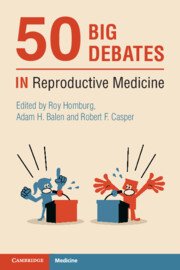Book contents
- 50 Big Debates in Reproductive Medicine
- Series page
- 50 Big Debates in Reproductive Medicine
- Copyright page
- Contents
- Contributors
- Foreword
- Introduction
- Section I Limits for IVF
- 1A Female Age 42 Years Should Be the Upper Limit for Conventional IVF/ICSI Treatment
- 1B Female Age 42 Years Should Be the Upper Limit for Conventional IVF/ICSI Treatment
- 2A Women with a BMI over 40 Should Be Refused Fertility Treatment
- 2B Women with a BMI over 40 Should Be Refused Fertility Treatment
- 3A Female Age of Menopause Is a Fair Limit for Ovum Donation
- 3B Female Age of Menopause Is a Fair Limit for Ovum Donation
- 4A Social Egg Freezing Should Be Available Up To the Age of 40 Years
- 4B Social Egg Freezing Should Be Available Up To the Age of 40 Years
- Section II IVF Add-ons
- Section III The Best Policy
- Section IV Embryology
- Section V Ethics and Statistics
- Section VI Male-factor Infertility
- Section VII Genetics
- Section VIII Ovarian Stimulation
- Section IX Hormones and the Environment
- Index
- References
3A - Female Age of Menopause Is a Fair Limit for Ovum Donation
For
from Section I - Limits for IVF
Published online by Cambridge University Press: 25 November 2021
- 50 Big Debates in Reproductive Medicine
- Series page
- 50 Big Debates in Reproductive Medicine
- Copyright page
- Contents
- Contributors
- Foreword
- Introduction
- Section I Limits for IVF
- 1A Female Age 42 Years Should Be the Upper Limit for Conventional IVF/ICSI Treatment
- 1B Female Age 42 Years Should Be the Upper Limit for Conventional IVF/ICSI Treatment
- 2A Women with a BMI over 40 Should Be Refused Fertility Treatment
- 2B Women with a BMI over 40 Should Be Refused Fertility Treatment
- 3A Female Age of Menopause Is a Fair Limit for Ovum Donation
- 3B Female Age of Menopause Is a Fair Limit for Ovum Donation
- 4A Social Egg Freezing Should Be Available Up To the Age of 40 Years
- 4B Social Egg Freezing Should Be Available Up To the Age of 40 Years
- Section II IVF Add-ons
- Section III The Best Policy
- Section IV Embryology
- Section V Ethics and Statistics
- Section VI Male-factor Infertility
- Section VII Genetics
- Section VIII Ovarian Stimulation
- Section IX Hormones and the Environment
- Index
- References
Summary
Menopause marks the end of female fertility. This can be overcome by assisted reproductive technology to achieve pregnancy at any age by use of ovum donation with IVF and hormone replacement for embryo transfer. However, pregnancy is often hazardous for women over 45, with morbidity and mortality being increased around threefold due to increased risks of all obstetric complications. Risks to the children through prematurity are also significant and may cause lifelong disability or death. In childhood they may experience parental illness or bereavement. National fertility regulators in some countries, individual fertility clinics, and adoption agencies have all set parental age limits. Societal attitudes do not support post-menopausal pregnancy. Young egg donors also have reservations about giving to older recipients. Thus biologically, medically – both from the individual and public health perspectives – and sociologically, female age at menopause is a fair limit for ovum donation.
- Type
- Chapter
- Information
- 50 Big Debates in Reproductive Medicine , pp. 15 - 16Publisher: Cambridge University PressPrint publication year: 2021

